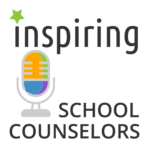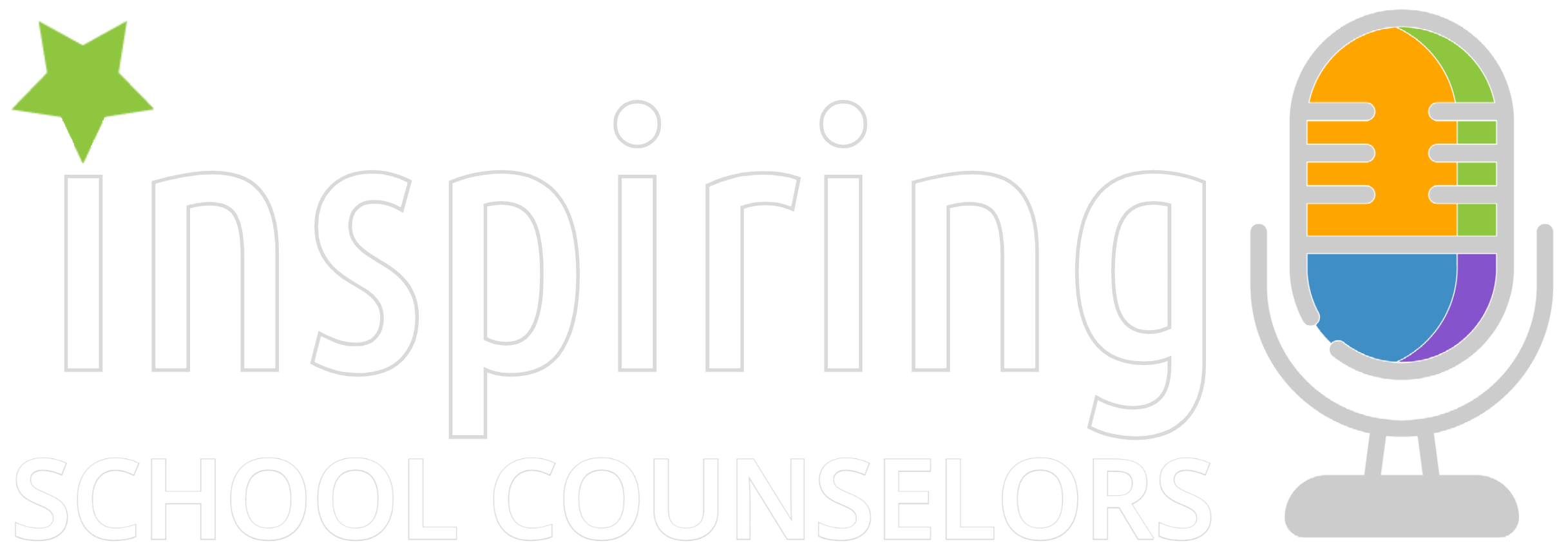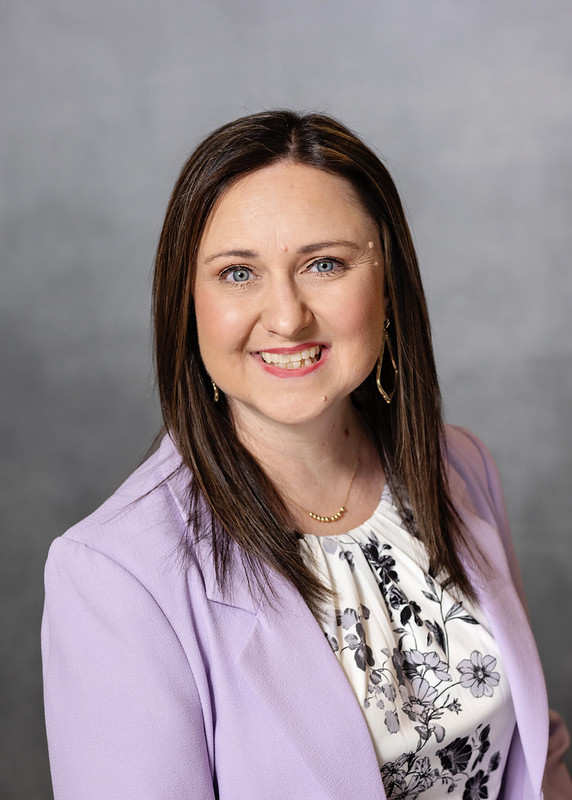K-12 school counselors help students succeed by working to close academic achievement gaps and grow student social-emotional health, but don’t forget the importance of helping students discover a passion for a future career. Arizona School Counselor of the Year Kristina Guy joins the podcast once again to explain how counselors can better connect students to potential careers.

About Kristina Guy
Kristina is a 4th generation, Arizona native who is a proud mom of three. She started her educational career in 2003 in the English Classroom and moved over to school counseling 9 years later. Kristina is a double graduate of Northern Arizona University and has spent her educational career in the west valley outside of Phoenix. She is currently working towards a second masters degree in Educational Leadership and plans to complete that program in December of 2023.
Kristina has served a variety of leadership roles from but currently serves as the Assistant chair of the Arizona School Counselors Association, was on an Arizona Legislative Ad-Hoc committee on Teen Mental Health, and was a member of the Skilled Careers Coalition to raise awareness for the Skilled Careers. Kristina teaches and presents professional development in a variety of ways throughout the year to an instructional staff at a variety of levels from local campus PD to presenting at state-wide, regional and national conferences and trainings.
Kristina is a firm believer in advocating for certified school counselors in every school due to the importance they play in building student future ready skills. She advocates for career exploration and development to start in the early years to truly allow students to learn the many opportunities they have after high school. As a firm believer in life-long education, it is important to Kristina to educate and strengthen the future of our tomorrow.
Recently, Kristina was named the 2021 Arizona School Counselor of the Year and was honored in Washington DC in February, 2022. Kristina was also named the 2022 Arizona Career Guidance Award for ACTEAZ and the 2023 ACTE Region V Career Guidance Award representing 15 states and Guam. She will compete for the National Award in November of 2023.
Subscribe
Inspiring School Counselors is available on these podcast apps and others. If you can’t find the podcast on your favorite app, let us know and we’ll make sure we get there. If you prefer to listen in your browser, visit https://inspiresuccess.org/podcast every week for a new episode. For new episode notifications and more, follow Inspire Success on Facebook, Instagram, or LinkedIn.
Transcript
A rough transcript follows.
Matt Fleck:
Hi, everyone. Welcome back to the very last Inspiring School Counselors podcast. We’re glad to have you with us. I’m Matt Fleck with Inspire Success.
When you’ve been in school counseling for a bit, you begin to see regular pendulum swings regarding what school counselors should be focusing on. For the last several years, that focus, quite understandably, has been on students’ wellbeing. And while that continues to be critically important, we’re beginning to see communities say, let’s not forget about students’ career and post-secondary preparation. Arizona’s former School Counselor of the Year, Kristina Guy, works with Career and Technical Education or CTE programs and joins my colleague Aimee Portteus again, to discuss the critical importance of linking students’ wellbeing with career and post-secondary readiness.
Aimee Portteus:
Tell us a little bit about your work in the CTE world and what maybe we as school counselors need to consider when we’re thinking about CTE with our kids.
Kristina Guy:
So being in the CTE world, it’s just so amazing to see what these kids can do so young. So I work at a specialty school. It’s a career and technical school only. So students at my school go to two different campuses. They go to their graduating high school for half of the day, and then they come to me for half of the day for that career training.
So whether it’s a certification based program or a licensure program they come to me. Most programs are two years, some are only a year. And these kids are doing great things. They’re able to go straight to work when they graduate high school if they want to. But I think one of the biggest misconceptions, not just school counselors, but as a society, is we think that CTE is for students not going to college, not going to a four year university. And it’s actually just the opposite.
CTE classes are rigorous. We offer a lot of dual enrollment or concurrent enrollment where students are earning college credits. And many of our students – 70% of the students in my district, at least – go onto a four year university. We have medical assistants who want to be doctors or surgeons. We have students in our dental assisting program who want to be orthodontists. Nursing. I mean, we have a lot of programs that lead straight into college. And we’ve had alumni come back and say, it’s such a great first step in this pathway because they go into a university with experience that a traditional high school graduate wouldn’t have. I mean, how many students do a 120 hour externship in a doctor’s office before they enter college? Not a whole lot.
Aimee:
Let’s talk about your role as a school counselor with those students. If I’m working with students who are contemplating whether they want to go into a CTE program or not, what should I keep in mind? How do I talk to kids about those kinds of things?
Kristina:
My campus is a little different in that we have some of those CTE programs that aren’t always replicated on a high school campus because they’re expensive. But so many of our high school campuses across the country have phenomenal CTE programs. And so it’s really just knowing what’s available and what they can offer. What type of certification do they offer? Dual enrollment, you know, how is this going to help the student in the long run? And it’s not always the student that’s the harder sell. It’s usually the parent who says, well, I don’t want my kid, you know, working outside in Arizona. It’s 116 today and 116, you know, weather. And I mean, yeah, some kids don’t want to do that, some kids thrive in that. But we have actually, we had a few of our construction kids a couple of years ago get picked up by one of our industry partners and a masonry company. And so they worked for that masonry company while that masonry company paid for them to go to one of our local universities and get a construction management degree.
Aimee:
So, we all know that traditionally career counseling is a high school counselor’s role. But I think we as a nation are starting to realize that we need to change that script just a little bit. So what would you say is the importance of career counseling in middle school or even in elementary school?
Kristina:
Well, I think it’s – and when we get into elementary school, it has to be – exposure. We’re in kind of a cyclical process right now where we wait until students are in high school to expose them to this. And really that’s too late. We need to make sure that we’re doing the bring-your-family-member-to-school day to share about the career that they have and the different options. Because when we say, oh, I want to go in the medical field, people think nurse or doctor not realizing there’s like 200 plus jobs just within the medical field. And so I think exposure at an early age, they can see. And then when we start getting into middle school, kind of start looking at that education that they need for that and really helping prepare that student for the pathway that they feel is best for them after high school. Making sure they know, okay, this is a university-bound career. You need to make sure you’re meeting university entrance requirements, but then if you want to do, you know, doctor, lawyer, anything like that, what are the requirements even further than that? So really getting them exposed to those viable pathways after high school. So they go into high school prepared full of knowledge to select the best classes for the pathway they think they want.
Aimee:
Yeah. And making their academic learning feel a little more relevant if they know where.
Kristina:
Right, right. And Arizona, we have something that’s called the ECAP, the Education Career Action Plan.. It’s called something different in a lot of other states. And before it had only been required in high school. Well, legislation just mandated that it go down to middle school now. So we see more career exploration in the middle school. Unfortunately, it’s an unfunded mandate, so it’s kind of a mix and match of who’s doing it, who’s doing it with fidelity. But I think that it’s a start. We have to start there. And then educate administrators. Like, this is important. You know, also, not every elementary school or middle school even has a school counselor. And so that’s kind of been my soapbox is we have to get adequate certified school counselors in every school, not just because of social emotional, which is huge right now, but for every other piece of [school] counseling that’s so important that if you have a counselor who’s one to 900 or one to 1200 and switching schools, I mean, they’re just triage at that point, you know, and we’re not teaching kids emotional regulation and decision making and all of those really important things in addition to career exploration at the younger ages.
Aimee:
Right. And some of those social emotional skills are so important in your career that we really are covering both things if we have enough people to cover them.
Kristina:
Right. Right. There’s a saying that says, if you’re mad or sad, you can’t add. Well, if you’re mad or sad, you can’t be a productive worker either. So it’s more about teaching those skills in the younger grades so that they grow with them and then are productive members of society and working, contributing adults to the economy.
Aimee:
That’s right. That’s great. Do you have particular resources that you would say, if I want to grow my capacity in the career domain in the college and career domain as a counselor, where would I look?
Kristina:
Talk to your CTE teachers. I think that is probably one of the things that is done the least. And they’re right there on their own campuses. Go talk to the teachers, go sit in on a class and see what they’re doing. Volunteer to judge one of their CTSO events and really get to see these kids in a different light. Go to one of their advisory council meetings, you know, meet their industry partners. You know, maybe one of their industry partners can help the counselor out with something. I’ve had that happen a lot where, you know, we put on a big senior type event and we got business and industry to donate a lot of the stuff that we did because they’re part of our CTE programs. And so I think it’s looking within, but then starting with some of those nationally well-known sites that we know are well developed.
Aimee:
Yeah. Awesome.
Kristina:
I see it all the time where parents tell a student, you are going to do this. And you just know it’s not what that student loves, it’s not what they’re interested in. You just know that it’s going to be a harder challenge for them to be successful in that. A lot of students that I have go to a four year university because my parents went to a four year university and it’s the only way that I’m going to be successful. And we know that’s not true. You know, looking at that website that I referenced, the US Bureau of Labor Statistics, only 25% of the jobs in this country require a bachelor’s degree or higher. Yet we’re still pushing a hundred percent of our kids to go to a university. And I think we’re just doing them a disservice by not allowing them to kind of look and explore and figure out what’s going to be the best for them with the help of their family.
Aimee:
That’s awesome. Do you have a good relationship with your Department of Education and your school counseling association?
Kristina:
We did. We just met with our state superintendent about a month ago. I would say Superintendent Tom Horn. And we as an association try to remain apolitical because we know that we have to serve all of our school counselors and we don’t know where they fall. So it’s really important that we stand in the middle, like a Switzerland type of thing, so that we are serving all counselors so they can serve all students. But we met with him and he came in on the belief of no-CRT, SEL-is-bad type of thing. And really didn’t understand the breadth of what school counselors had done. So we wanted to sit with him and kind of explain what we do and different things like that and kind of explain some of the things that he supports our social emotional learning.
We got into a discussion about the difference between social emotional learning curriculum and social emotional learning development. That it turns out that some of the curriculum is kind of what was causing that negative perception with him and some of his followers, some of his voters. And so really just trying to dispel that we’re out there to do good, to partner with parents and to help students. That’s what we all want to do. We want to help students so that teachers can teach, administrators can lead, and then we’re there kind of as that glue in the middle to hold it all together. And so it was a very positive, productive meeting.
Aimee:
That’s wonderful. We know that professional advocacy is always going to be important. So I’m glad to hear that. And I really like that the glue that holds it all together. That’s sounds like something we should put on a t-shirt!
Kristina:
I had heard something a few years ago that school counselors were the junk drawer and I’m not a fan of that because I know what my junk drawer looks like. And I know there’s a lot of things in there that I can’t use that I just put there because I’m not ready to let go of yet. And so I much prefer the analogy of us being the glue because it’s stronger. It sounds more cohesive. It sounds like we’re a part of the team. And so, yeah, I really, I’ve latched onto that one.
Aimee:
Yeah,I like that. Well, thank you again for being with us today. We really appreciate you!
Kristina:
Thank you. Thank you so much. Always a good time.
Aimee:
Yes!
Matt:
That’s Christina Guy, former Arizona School Counselor of the year, and Arizona CTE Counselor of the Year, reminding us of the importance of all three domains of the school counseling profession.
Well, we are wrapping up today, I’m sorry to say, not only this podcast, but the entire Inspiring School Counselors podcast series unless a package of money drops from the sky suddenly. And I do keep looking! This is sadly the last of our 117 Inspiring School Counselors podcasts. Over the two and a half years we’ve been doing this, thanks to the extreme generosity of Lilly Endowment, Aimee Portteus and I have not only been enlightened and entertained, but truly inspired by the professional school counselors and other individuals we’ve gotten to know. Both Aimee and I will truly miss it. So a final farewell and a hardy thank you to all of our wonderful listeners. So long.

